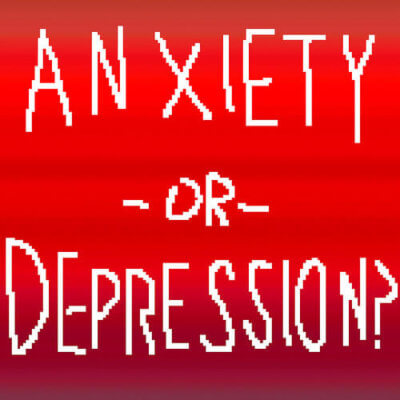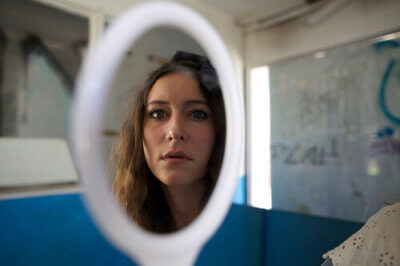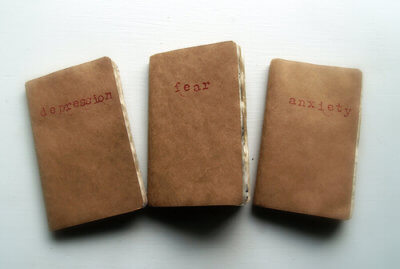Anxiety vs Depression – Which One Sounds Like You?

By: Topher McCulloch
by Andrea M. Darcy
When it comes to anxiety vs depression, there are a lot of similarities.
Both anxiety and depression can:
- involve negative thinking and distorted thinking
- leave you feeling hopeless and out-of-control
- can see you uninterested in your usual hobbies and activities
- can cause sleep problems and burnout
- and can leave you feeling unable to cope.
So how can you tell the difference when there is so much crossover?
What is anxiety?
Anxiety is not just stress (read the difference in our related article, stress vs anxiety).
Anxiety involves an ongoing sense of unease or fear, and out-of-control stressful thoughts. These symptoms will leave you feeling powerless, and make daily life more difficult.
Thoughts produced by anxiety are negative, and often dramatic, black-and-white thinking, or tinged with doom and gloom.
Anxious thoughts are also often future-based. Even if they are about something that has already happened, the anxiety will be over what will now take place because of it, i.e., he or she will think bad things, I will lose my job, my life will be ruined, etc.
Anxiety triggers the fight and flight response, which releases a cocktail of chemicals into your blood, including cortisol. This means you might often feel wired and buzzy.
The stress that anxiety causes often has physical affects, which can include:
- a racing heart and/or breathlessness
- sleep problems
- muscle tension including teeth grinding
- stomach upset
- feeling edgy and ‘wired’.
Depression

By: sprout_creative
Depression can have many symptoms and manifests differently in different people.
It’s not just being sad. (Read our article on the difference between sadness and depression for more on this.)
Some people become very emotional, whereas others feel numb. Some people might act out by things like binge drinking, or picking fights with those they love, while others might become very passive.
But the main things to look for with depression are feeling increasingly unable to feel joy or contentment , feeling constantly bad about yourself, and losing interest in the things that once mattered to you.
Your thoughts will be negative, distorted, and include doom and gloom. They might even be self-destructive.
Your thoughts will often be past-based. Depression thrives on dwelling on the things we cannot change, in ways that make us feel hopeless, guilty, and worthless.
Energy wise, some some find they manage to continue on despite feeling empty inside, referred to as ‘walking depression’.
But many find depression leaves them feeling drained. As for thinking, it can feel like your brain is full of cotton wool.
Depression also has physical symptoms, which tend to be:
- fatigue
- feeling weak in your body
- sleep problems or a change in sleep patterns
- possible ongoing flus and colds
- unexplained medical symptoms
- a change in appetite.
[For a complete breakdown of depression and its symptoms, please see our comprehensive Guide to Depression.]
anxiety vs depression – the differences
So let’s summarise the differences.
Depression vs anxiety looks like:
Tends to drain your energy vs. can put you on a cycle of buzzy highs and then lows.
Makes it hard to think vs. can leave you overthinking about the wrong things.
Can see you having self destructive thoughts vs leaves you having illogical thoughts.
Tends to be more past-based vs. tends to be more future-focused.
Is more prone to leave you feeling sad and guilty vs. is more prone to leave you feeling fearful, paranoid, and/or panicky.
Often it’s the physical symptoms that mark the clearest difference when it comes to depression vs anxiety – a racing heart and feeling edgy tend to be anxiety, whereas feeling really tired and listless all the time tends to be depression.
And yet, if you are worried about the future which you are sure you will be terrible and then feel hopeless, are you depressed, or anxious?
The answer is that you might be both.
Can you be both anxious and depressed at the same time?
It’s entirely possible to have symptoms of anxiety and depression at the same time, or what is called ‘comorbidity’ in psychology.
Here’s the thing – many people seem to have experienced anxiety disorder before developing depression, and continue to have anxious thinking while they are depressed. So while there is no study that ‘proves’ anxiety causes depression, it is seen as a leading symptom.
This is why it’s important to take your anxiety seriously. Anxiety can be easier to treat than depression, not least because the low interest in doing anything depression brings can also make seeking help feel harder.
Can I be treated for anxiety and depression at the same time?
The good news about anxiety and depression is that they both respond well to talk therapies.
And yes, many forms of talk therapy deal with both. Cognitive behavioural therapy (CBT), for example, is evidence-based to help with both and is often recommended by the NHS for anxiety and depression.
Harley Therapy connects you with anxiety and depression counsellors in three central London locations, as well as throughout the UK and over the internet.
 Andrea M. Darcy is a mental health and wellbeing expert and writer. She loves to take complicated concepts and make them easy for anyone to understand. Find her on Instagram @am_darcy
Andrea M. Darcy is a mental health and wellbeing expert and writer. She loves to take complicated concepts and make them easy for anyone to understand. Find her on Instagram @am_darcy






I have been throwing up sweating heart feels like it is coming out my chest this while im trying to sleep im cold then when i cover up i begin to sweat
Hi Sheila, this sounds severe, do get a checkup with your GP just to rule out other things.